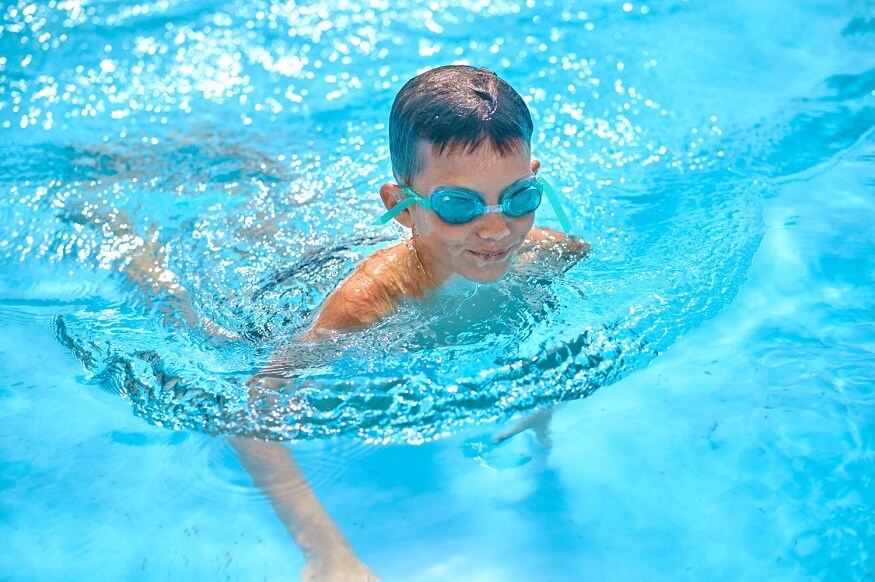Swimming is a form of physical activity that has an endless number of benefits. If one pursues this compelling activity, they can relieve a lot of anxiety and, in turn, be advantageous to their mental, emotional, and physical stature. Water sports are a low-impact workout that can improve cardiovascular health, strength, flexibility, weight management, and overall well-being. Swimming can also provide stress relief, improve mood, and promote social interaction. It doesn’t matter if you swim for leisure or otherwise, swimming is one of the most renowned ways to improve your health and fitness and, without a doubt, have fun while doing it. Children as young as only a few months old can start learning to swim. Research around the world shows the benefits of swimming in early childhood. The best age to learn swimming is 1-2 years. In this blog we will look at some advantages of swimming.
Also read : Balancing Macronutrients in a Child’s Diet: Understanding the right proportions of carbs, proteins, and fats
Importance of swimming
The most important benefit of swimming is that it is a total body workout. Water is 800 times denser than air, so the fact that the human body moves in this resistance medium of water makes it the best obstacle and pushes the body to work more than other normal workouts. Swimming really engages the muscles, improves the body’s strength, and tones the muscles. It also increases metabolism so that a controlled diet can convert to burning more calories throughout the day because the muscles are already more engaged while swimming. There are various such advantages of swimming.
Another benefit of swimming can also be improving flexibility, as the water provides a supportive environment that allows for a greater range of motion than other forms of exercise. Swimming daily can help in managing weight and maintaining a healthy body composition. It is known as one of the most high-calorie-burning exercises that can burn up to 500 calories per hour, depending on the intensity of the workout. Swimming can also increase muscle mass, which can boost metabolism and help burn more calories throughout the day.
Swimming, unlike other sports, allows the swimmer to aerobically engage the body, heart, and lungs. The heart rate is elevated for a sustained period of time even if there are breaks in between. Swimming is a great cardio workout and is also a low-impact cardio workout. Similar to running and biking, swimming is aerobic and gets the heart rate up. However, unlike running, for example, swimming has a low impact on the joints. When one is in the medium of water, which as discussed is denser than air, it supports the body, and because of the considerable resistance, swimmers can get a great workout with low impact on the body.
Unlike other sports, where one can only play for a limited amount of time in life, swimming is a lifelong fitness exercise. Swimming is the only activity that one can engage in from birth to death. A newborn who has spent time in the womb is essentially swimming as soon as they are born. Young children can pick up swimming, whether they want to use it for recreational purposes or compete in the sport.
Also read: Why swimming lessons should be enrolled for your child
Benefits of swimming
Swimming is a popular activity for children of all ages, with numerous benefits. It is not only enjoyable and pleasurable, but it also has positive effects on both physical and mental health. Early swimming instruction can be especially beneficial for kids, as it can support the development of important abilities and provide the groundwork for lifelong healthy habits. The best age to learn swimming is any age, and let’s discuss the benefits of starting early swimming for children and why it is a great activity for kids of all ages. Let’s look at some of Benefits of swimming
Physical health benefits
Unlike other sports, swimming enables the participant to use their body, heart, and lungs aerobically. Even with breaks, the heart rate remains elevated for a prolonged period of time, making it a terrific cardio workout. Additionally, it is a gentle cardio workout. Swimming is an aerobic activity that increases heart rate, just like biking and running do. However, swimming has less of an impact on the joints than running, for example. Due to the substantial resistance provided by the water, which is denser than air and supports the body when submerged, swimmers may work out hard with little harm to their bodies.
Water safety skills
Swimming is an essential life skill in addition to being entertaining and enjoyable. Teaching toddlers swimming would help the children to become good at various styles of swimming. They can even take an interest in the sport of swimming and indulge professionally. Teaching young people swimming would definitely come in handy in case of tricky situations like incidents in water or pools or school field trips where water bodies are involved.
Also Read: Water Safety Tips for Kids
Gross and fine motor skills
Gross and fine motor abilities, which are crucial for total physical development, can be developed by swimming. Learning swimming at a young age can tone a child’s muscles in a very effective manner. Swimming makes use of the muscles that are important for future growth of a healthy body.
Empirical skills
The benefits of swimming have been shown to improve cognitive skills, including memory, attention, and problem-solving. It has been demonstrated that swimming provides advantages for enhancing cognitive abilities such as memory, attention, and problem-solving. Kids must use their brains in a variety of ways when learning to swim, such as by remembering the mechanics of their strokes, paying attention to their surroundings, and deciding how to move through the water.
Also read: Swimming Pool Rules that Every Child Should Know
Competitive swimming
Starting early swimming for children can provide a foundation for competitive swimming if they choose to pursue it later on. Early swimming lessons can help children to develop proper stroke techniques and build endurance, which are essential skills for competitive swimming. Early exposure to competitive swimming can also help children to develop a love for the sport and provide opportunities for them to meet new people and participate in exciting competitions.
At EuroSchool, we encourage students to engage in different sporting activities according to their preference. Swimming is an important sport. Parents should provide opportunities for their children to learn and master the technique of swimming so that children can learn this exciting sport and cultivate it according to their future preferences.










